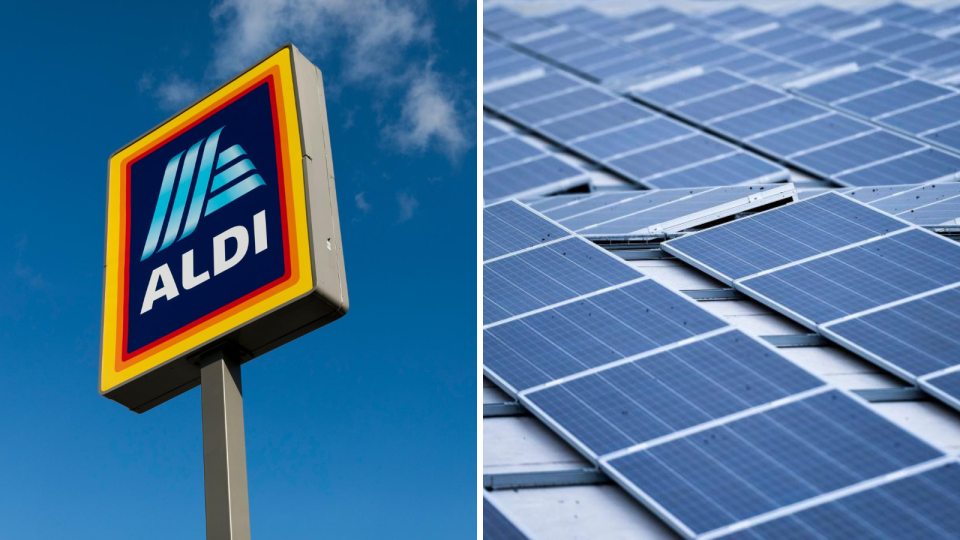Coles, Woolies challenged as Aldi makes new move in supermarket war

Aldi has attracted praise from environmental organisations for its commitment to 100 per cent renewable energy.
The German supermarket giant announced on Wednesday it was committing for its Australian operations to be 100 per cent powered by renewable electricity by 2021.
“ALDI is the 64th biggest user of electricity in Australia, powering 555 stores and eight distribution centres around the country,” Aldi said in a statement.
“The business’ shift to renewable energy sources should provide clear evidence to Australia’s top energy users that renewable alternatives are affordable when factored in to long term planning.”
Aldi has made its commitment off the back of two ten-year deals with large-scale wind farms that will power all of Aldi’s NSW and Victorian stores.
Aldi will also harness solar panel rooftops to ensure more than 250 Aldi stores and six distribution centres will be solar-powered by the end of 2020.
“This is the equivalent of taking 11,700 cars off the road per year or generating enough electricity to power 7,000 average Australian homes.”
Aldi Australia CEO Tom Daunt said the supermarket wanted to build on its reputation for providing high-quality products at affordable prices.
“As we continue our journey in Australia, we want to reassure our shoppers that how we conduct business is equally important as the value we offer,” Daunt said.
Greenpeace has welcomed Aldi’s move and called on Aussie supermarket rivals Coles and Woolworths to match the commitment.
“Renewable energy is the cheapest form of energy and is bringing down power bills across the country,” said Greenpeace Australia’s Lindsay Soutar.
“In a sun-soaked country like Australia, it just makes so much sense to use [roof] space to generate clean and affordable power.”
“ALDI making this commitment demonstrates it’s both possible and desirable for our biggest supermarkets to run entirely on renewable energy and paves the way for Coles and Woolworths to do the same.”
All three supermarkets have made shifts away from plastic, with Coles and Woolworths offering reusable bags at a price.
Woolworths is actively looking to decrease its non-recyclable packaging, and has also been increasing the amount of food waste it diverts from landfill.
Coles has also committed to diverting 90 per cent of its supermarket waste from landfill by 2022 and to have the packaging for Coles-branded items recyclable by the end of this year.
In terms of energy and greenhouse emissions, Coles has installed solar panels for 68 supermarkets.
In August last year, Coles signed an agreement to secure three new solar plants.
“Our ambition is to be Australia’s most sustainable supermarket and we're always looking for opportunities to make a positive difference through our commitment to sustainable products, sustainable environmental practices and sustainable communities,” a Coles spokesperson told Yahoo Finance.
“We’re focused on managing waste (including food waste) and recycling, building more energy efficient stores and reducing greenhouse gas emissions. At the same time, we're working to maintain food security and adapt to extreme weather events and the impacts of climate change.”
Woolworths has focused efforts into installing LED lighting for energy efficiency.
“Further investments have included the installation of solar power systems across a range of trading stores,” its website states.
A Woolworths spokesperson told Yahoo Finance that the supermarket was committed to reducing energy use across the business.
“We’re continuing to install more efficient lighting and refrigeration systems, whilst also generating renewable energy for our stores through our new solar panel systems,” they said.
“We recognise there is more to do and continue to look for ways to reduce our environmental impact.”
Make your money work with Yahoo Finance’s daily newsletter. Sign up here and stay on top of the latest money, economy, property and work news.
Follow Yahoo Finance Australia on Facebook, Twitter, Instagram and LinkedIn.

 Yahoo Finance
Yahoo Finance 

